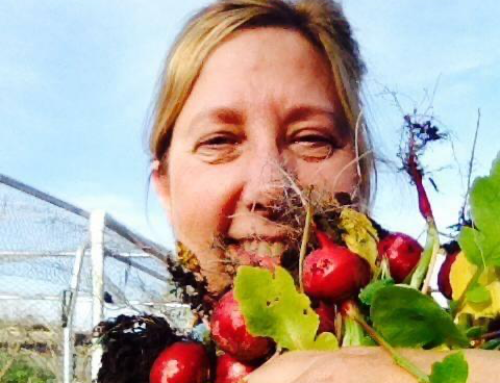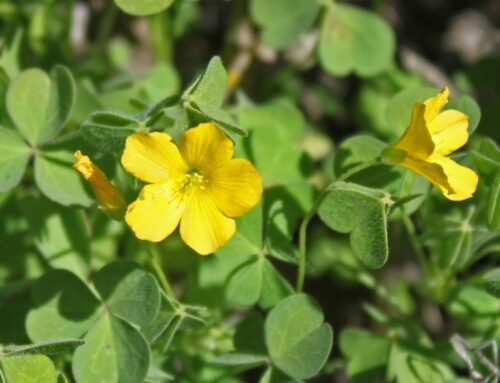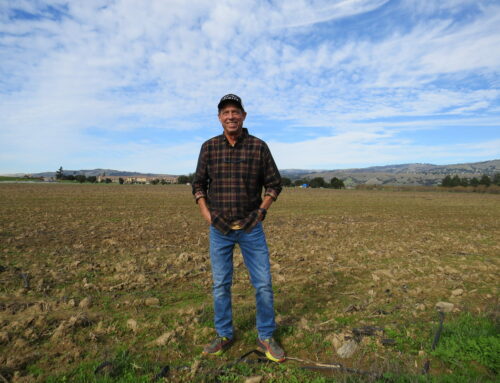Signals from satellites allow people to navigate to a spot using precise longitude and latitude coordinates
Published in the Nov. 12-25, 2014 issue of Morgan Hill Life
By Staff Report

Henry W. Coe State Park uniformed volunteer Debbie Fredericks shows off a medallion found inside an ammunition box by students learning how to geo-cache during an Oct. 18 class on the hobby. Photo courtesy Bonnie Daley
On a rainy Saturday afternoon in October, a small group of students discovered hidden treasure in a hollow oak tree trunk not far from the Visitors Center at Henry W. Coe State Park. Debbie Fredericks went home that day with a small medallion that had been placed about a year before in an ammunition box.
Fredericks and other students were participating in a geo-caching workshop held Oct. 18 as part of the Coe-Ed Day put on for uniformed volunteers of the Pine Ridge Association, the nonprofit organization that provides support to Coe Park. It was Fredericks’s first time on a geo-caching expedition. The treasure-hunting hobby was started about a decade ago when signals from orbiting satellites allowed ordinary people to navigate to a spot using precise longitude and latitude coordinates. There, they could find a hidden cache such as a metal box or small film canister and discover inexpensive items they could trade for other items they brought. With smart phones, geo-caching opened up to provide clues on an online website to help people navigate to find the cache.
“I liked it because it’s a combination of playing in a game and being out in the wilderness,” Fredericks said. “I’m sure the game is fun even if you’re in an urban environment. The game part was unique because it combines a whole bunch of stuff. It makes you think, you have to walk around and follow the clues and it’s rewarding with a sense of satisfaction of finding the cache.”
Geo-caching is especially rewarding for families with children because it encourages them to see the wilderness as a fun place to visit and explore, she said. Coe Park has about 150 geo-caching sites of varying difficulty to find.
“There’s several spots near the Visitors Center and it motivates kids to go up a hill that they wouldn’t necessarily go up,” she said. “And you never know what you’re going to find in the box.”
Uniformed volunteers John Thatcher and Tom Conrad started the Coe Park geo-caching opportunities for the public several years ago.
“The park was going to be shut down and we were scrambling around for ideas to attract people into the park,” Conrad said. “I was out on Coit Road hiking and saw this couple and I asked what they were doing and they were very forthright and told me they were going to do this loop and geo-cache.”
Conrad and Thatcher realized that geo-caching was an entertaining and educational activity for the public to add to the Coe Park experience, so they met with a park ranger who discussed the project with a park district manager. Soon, geo-caching was approved for Coe Park in specific areas that would not lead to disturbing sensitive wilderness property.
Thatcher said that geo-caching encourages people to try new hikes to areas they might not usually go and discover new vistas in the 87,000-acre park. A friend of his has been a geo-caching hobbyist since 2001 and he went out with her one day on a geo-caching expedition and found a cache that she hadn’t been able to locate. After that, he was hooked. Thrasher has recorded 1,304 geo-caches on a website devoted to cataloging geo-cache finds.
“It’s kind of like a scavenger hunt, Easter egg hunt, treasure hunt all combined using GPS to locate some treasure,” he said. “The appeal is there’s the challenge of finding different things, the challenge of walking some place you didn’t think you could get to, or the fun of seeing a beautiful view.”
He and Conrad teach a basic geo-cache course at the annual Tarantula Fest, an event that brings many families to Coe Park in the fall.
“It’s especially fun for children because kids love Easter egg hunts and this has the same kind of appeal,” he said. “Part of the fun is that you find toys in the cache and you get to trade something you brought for what you found.”




